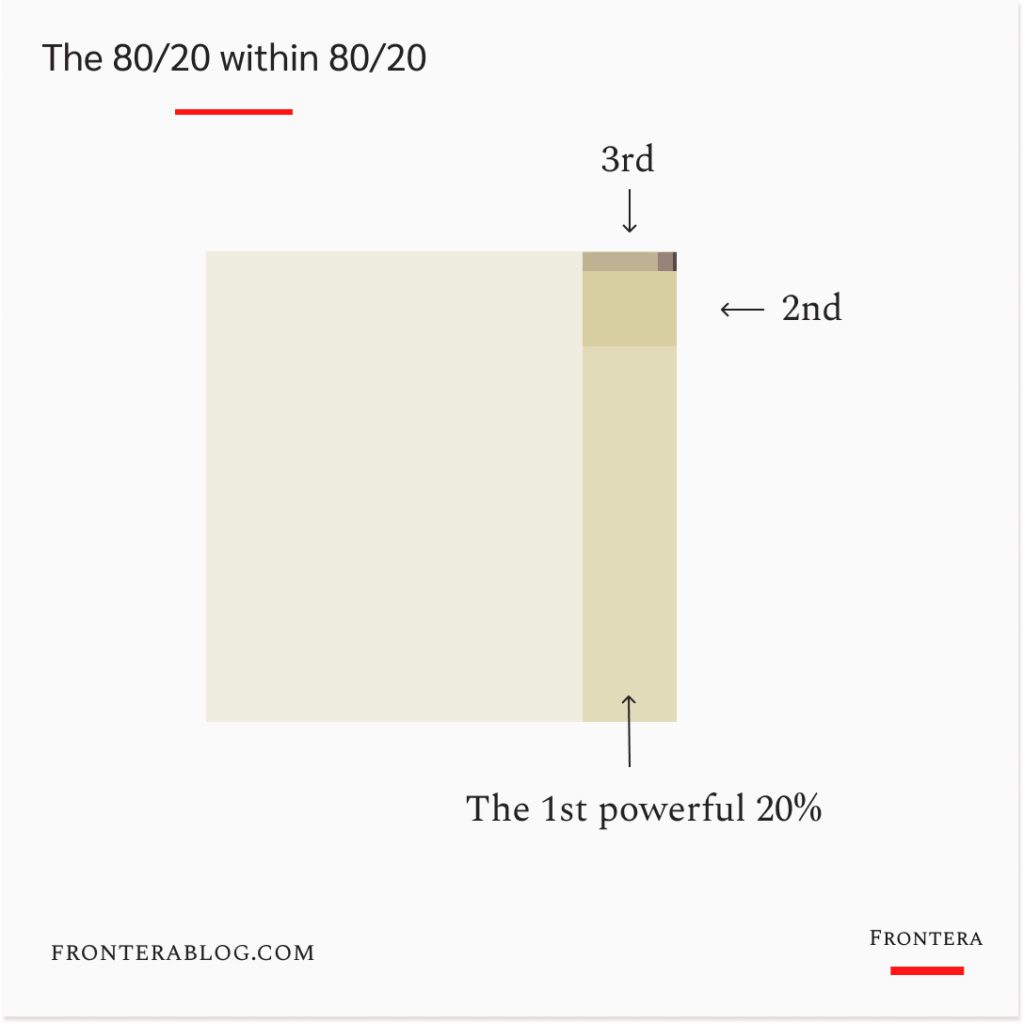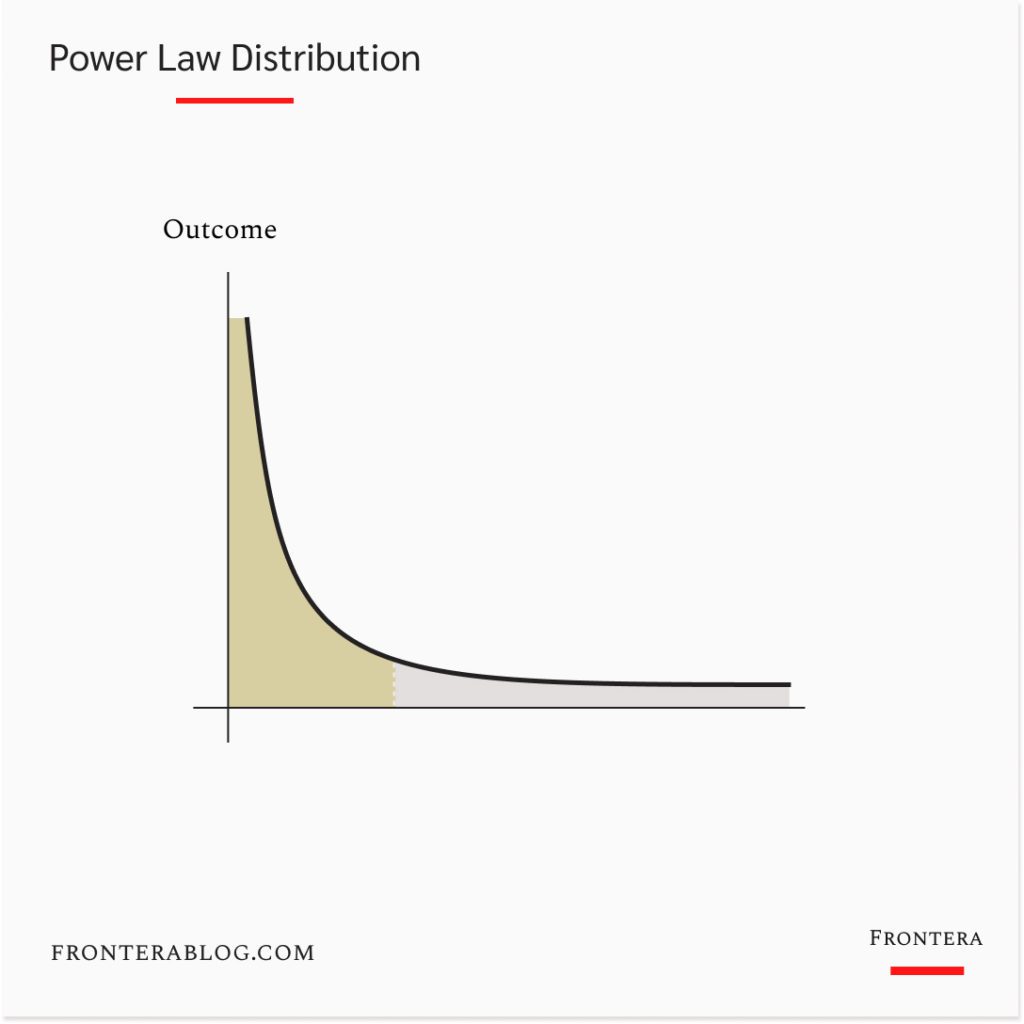Imagine a friend inviting you to dinner.
He texts you: “I’m organizing a dinner with 8 people and the average net worth of attendees is $22 billion.”
What would you think?
Besides wondering when your friend met that many rich people, you’d expect to be the least wealthy among invitees.
But you arrive at dinner and realize it’s not the case.
You are the second wealthiest person at the table.
And your friend told you the truth, the average net worth is really $22 billion.
But he didn’t tell you one thing: one guest was Elon Musk.
When the 80/20 Rule Becomes 99/1
You probably know the Pareto principle.
It’s a power law.
80% of the outcomes come from 20% of the causes. And vice versa.
But what most people miss is that it’s a fractal rule.
It means the 20% also has a powerful 20% within it. And that 20% also has another 20%…

So when you dig down a few levels, you see the extreme results; like Elon Musk representing 99.9% of wealth and distorting averages wherever he goes.
Mediocristan vs. Extremistan
Now, the power laws are hard to grasp for our linear minds.
But Nassim Taleb makes it easier to understand with an analogy.
Imagine two worlds: Mediocristan and Extremistan.
In Mediocristan, everything is predictable and stable.
Some examples:
- Height: When you go for a walk, you don’t expect to see a 3-meter human. You see some tall and some short people, but the average height is always within a normal range.
- Life Expectancy: Some people live longer than others, but you don’t celebrate anybody’s 200th birthday.
- Salaries: If you have a salary, you can more or less calculate how much you’ll earn next year. Unlike a business —which has many ups and downs— it’s stable and predictable.
But when you step into Extremistan, power laws rule.
Results become unpredictable and extreme. The distribution of outcomes starts to look like this:

We’ve talked about wealth. Some other examples:
- Book sales: Publishers lose money with thousands of books. But a few “bestsellers” bring in so much revenue that they offset the cost of all books and make publishers profitable.
- Search engine results: The top three rank gets 55% of the clicks among thousands of results. For popular search queries, it means millions of clicks vs. hundreds on the second page.
- Stock market returns: The majority of overall market returns come from a few companies over the long term. If you were so lucky to know Warren Buffett in 1965 and invest $10,000 in Berkshire Hathaway stock, you’d have around $300 million now. But many other companies from 1965 don’t even exist today (remember survivorship bias).
As you see, modern life shifts more and more toward Extremistan.
So while most people still try to operate with the rules of Mediocristan, how can you navigate in an extreme and unpredictable world?
Three tips to survive in Extremistan
1. Be the winner
In Extremistan, the winner takes all.
So you have to be the winner.
How?
By going niche and solving specific problems. Let me use the search example again.
If you target a generic keyword (e.g. recipes) on Google, you have no chance to be the first.
The competition is fierce.
But if you target a long-tail niche keyword (e.g. muscle building recipes on a budget), you can be the winner.
And you’d get all the traffic for that query.
The same applies to your business or skills.
Remember talent stacking.
It’s almost impossible to be the best at one thing.
But you can build a unique talent stack —create your own niche— to be the best.
2. Cover your downside
Yes, the upside potential is huge in Extremistan.
But the risk is high, too.
So prepare for the unexpected.
Avoid bets that might ruin you and increase redundancy in good times to be ready for shocks.
3. Do high-leverage tasks
The power laws also apply to your activities.
Replying to unimportant emails can’t have a 100x outcome.
But sending one cold email to a key person might have.
So design your days around high-leverage tasks that would make everything else unnecessary.
The same applies to your projects.
Before choosing what’s next, use RICE scoring to find the one with the optimal effort and impact.
In Extremistan, what you work on is always more important than how hard you work.
Enjoyed this article?
Then you’ll love the How Brands Win Newsletter.
Get the “7 Positioning Sins That Cost B2B Brands Millions” guide when you join. It’s free.
References: Nassim Taleb, Black Swan.
